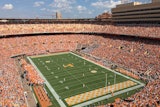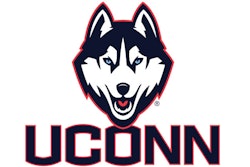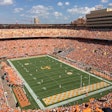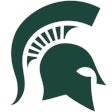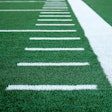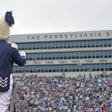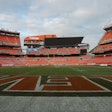![[Photo courtsey of sportsvideo.org]](https://img.athleticbusiness.com/files/base/abmedia/all/image/2020/10/ab.startinglines1020_feat.png?auto=format%2Ccompress&q=70&w=400)
Fans have never had more options when it comes to how they choose to consume a sporting event. Advances in technology have made it easier than ever for at-home fans to craft an ideal environment — making the couch a more direct competitor to the live experience.
Venues have a chance to combat this and provide an in-venue experience that will keep fans coming back by bringing the best of home technology to the stadium or arena.
"If I'm a college student and I want to go to a venue, I can't be in a connectivity black hole," says John Brams, senior director for venues, retail and logistics with technology services provider Extreme Networks. "That's no longer acceptable. But in a lot of environments, that's still the case."
The ability to maintain our digital habits, even while we're at the game, is key. "I want to be able to do my email, I want to look at my social media, I want to be immersed in the technology there," Brams says. "That's kind of the simplest way to look at it."
As fans' demand for Wi-Fi services at live sports events grows, venues that fail to provide it could eventually lose out, argues Brams.
"Because let's be honest, it's costly," he says. "It costs people a lot of money to go to these venues — you have to travel there, you have to buy the ticket. Operators have to start to think about doing things to continue to make sure that people want to make that investment and to make sure that they are going to want to come back."
Still, facilities seeking to provide fans with great in-venue connectivity needn't do so merely to appeal to TikTokers, Tweeters and Instagrammers. Venue operators can leverage analytics tools to better understand those users, gaining valuable insights — both in terms of marketing and operations.
Marketing
Simply providing a functional connectivity experience that meets user expectations presents a marketing opportunity, according to Brams. Venues can partner with brands to offer Wi-Fi users a branded message upon connecting.
Meanwhile, the user-generated data — decoupled from individual devices for privacy reasons — can also pay dividends.
"If you're going to make this investment, you want to understand what people are doing," says Brams. "How are they using the network? What applications are they using? Is there a chance to monetize this as part of that strategy? Having that data is equally as important as having the network itself."
Brams shares an anecdote of an MLS facility that utilized a data analytics tool to identify a large segment of fans at soccer games who also happened to be active users of a particular dating app — eventually leading to a sponsorship deal.
Similarly, data analytics tools can provide proof of user behavior, which can be useful in conversations with marketers. "With a sponsor, if you're trying to do some sort of activation, you can now validate that it actually happened, because you have the analytics to support it," Brams says.
Venues can also seek user-specific data, offering those connecting to in-venue Wi-Fi a coupon, discount or giveaway in exchange for a few more details about who they are.
"It gives them new contacts to potentially sell and leverage in the future," Brams says. "So there's a really nice return on investment there, because then you have people whom you may not have access to, but now, by their joining the Wi-Fi, you have some more information about them."
Operations
As is the case elsewhere, the COVID-19 pandemic has accelerated trends that were already taking place in sports venues.
The Petersen Events Center at the University of Pittsburgh, where Pitt deputy athletic director Christian Spears says part of the goal of upgrading its Wi-Fi via Extreme Networks was to provide fans with "a touchless, cashless, contactless experience," provides a good example.
"As we're talking to venues about the go-forward plan as you start to reintroduce people, there's a whole bunch of concepts that they have to deal with now that they may not have had to deal with before," Brams says. "And certainly one of the biggest issues is how do you get into the venue?"
The prevalence of ticketless entry could place even higher demands for Wi-Fi connectivity on particular areas of a stadium or arena.
"If you think about how that works, you have to extend the capacity at those gates to allow potentially for people to download their tickets, and potentially for people to queue up farther away from the venue, and that just wasn't something that you had to contemplate until recently," Brams says. "Ticketless scanning does require, in some cases, additional [Wi-Fi] capacity.
"It's the same story for potentially contactless payment within a venue," he adds. "You might now have to set up places to do concessions and payment where you just didn't have it before."
Analytics data can provide a boost to facilities from an operational point of view, as well, as platforms can track how users — or at least their connected devices — move throughout a space. In the COVID-era, those insights become even more valuable.
"When someone enters your venue, what do they do?" asks Brams. "Do they go to their seat? Do they go to concessions? Do we see areas where a lot of people are congregating, and if that's the case, should we make adjustments to it?"
While upgraded in-venue Wi-Fi is ultimately about providing an added value to the experience for fans, savvy venues can leverage such solutions to their benefit. Brams says that it's only a matter of time before such Wi-Fi amenities are considered standard — but what comes next is up to users.
"People have pretty high expectations as to what their experience is going to be," says Brams. "I think that every single one of these facilities will do something. I think eventually that will happen specific to the collegiate market. And then from there I think it's all about leveraging the asset."
This article originally appeared in the October 2020 issue of Athletic Business with the title "Improved in-venue Wi-Fi boosts more than just fan experience." Athletic Business is a free magazine for professionals in the athletic, fitness and recreation industry. Click here to subscribe.














